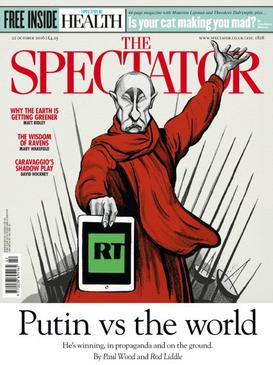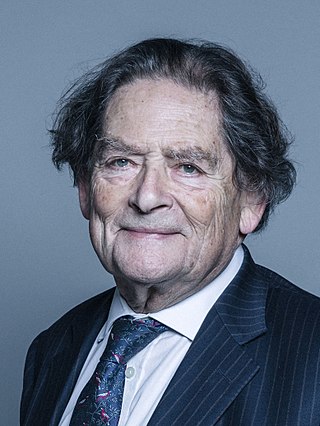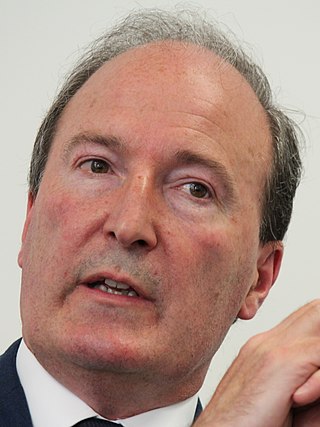Related Research Articles

The Spectator is a weekly British news magazine focusing on politics, culture, and current affairs. It was first published in July 1828, making it the oldest surviving weekly magazine in the world.

Nigel Lawson, Baron Lawson of Blaby, was a British politician and journalist. A member of the Conservative Party, he served as Member of Parliament for Blaby from 1974 to 1992, and served in Margaret Thatcher's Cabinet from 1981 to 1989. Prior to entering the Cabinet, he served as the Financial Secretary to the Treasury from May 1979 until his promotion to Secretary of State for Energy. He was appointed Chancellor of the Exchequer in June 1983 and served until his resignation in October 1989. In both Cabinet posts, Lawson was a key proponent of Thatcher's policies of privatisation of several key industries.

Nigella Lucy Lawson is an English food writer and television cook.
John Diamond was an English journalist and broadcaster. In 1997 he was diagnosed with throat cancer, a subject he wrote about in his weekly column at The Times, as well as in two books. He was married to food writer and celebrity chef Nigella Lawson from 1992 until his death in 2001, and had two children.

Paul Bede Johnson was an English journalist, popular historian, speechwriter and author. Although associated with the political left in his early career, he became a popular conservative historian.
Rod Liddle is an English journalist, and an associate editor of The Spectator. He was an editor of BBC Radio 4's Today programme. His published works include Too Beautiful for You (2003), Love Will Destroy Everything (2007), The Best of Liddle Britain and the semi-autobiographical Selfish Whining Monkeys (2014). He has presented television programmes, including The New Fundamentalists, The Trouble with Atheism, and Immigration Is A Time Bomb.
Jeremy John Le Mesurier Wolfenden was a foreign correspondent and British spy at the height of the Cold War.

Charles Hilary Moore, Baron Moore of Etchingham is an English journalist and a former editor of The Daily Telegraph, The Spectator and The Sunday Telegraph; he still writes for all three. He is known for his authorised biography of Margaret Thatcher, published in three volumes. Under the government of Boris Johnson, in July 2020 Moore was given a peerage, thus becoming a member of the House of Lords.
Alexander Surtees Chancellor, CBE was a British journalist.

John Gross FRSL was an eminent English man of letters. A leading intellectual, writer, anthologist, and critic, The Guardian and The Spectator were among several publications to describe Gross as "the best-read man in Britain". The Guardian's obituarist Ion Trewin wrote: "Mr Gross is one good argument for the survival of the species", a comment Gross would have disliked since he was known for his modesty. Charles Moore wrote in The Spectator: "I am left with the irritated sense that he was under-appreciated. He was too clever, too witty, too modest for our age."
Morgan Goronwy Rees was a Welsh journalist, academic and writer.
Dominic Green is a British historian, columnist and musician. A Fellow of the Royal Historical Society and the Royal Society of Arts, he is editor of the US edition of The Spectator and a commissioning editor of The Critic. He is a columnist and film reviewer for The Spectator, and a columnist for The Daily Telegraph. He also writes frequently on books and arts for The Wall Street Journal, The New Criterion, The Spectator (UK), Standpoint, The Literary Review, and The Oldie. He has also written for The Atlantic, Commentary, The Economist, First Things, The Weekly Standard, CapX and the antiquities magazine Minerva.
Maria McErlane is a British actress and presenter specialising in comedy. She has been acting since 1984. She has appeared in several TV series, including The Fast Show, Gimme Gimme Gimme, Thin Ice and Happiness, "straight" roles in The Bill and Holby City and as the narrator for Antoine de Caunes and Jean-Paul Gaultier's Eurotrash.

Christopher Walter Monckton, 3rd Viscount Monckton of Brenchley is a British public speaker and hereditary peer. He is known for his work as a journalist, Conservative political advisor, UKIP political candidate, and for his invention of the mathematical puzzle Eternity.
Rosamond Mary Monckton, Baroness Monckton of Dallington Forest,, is an English businesswoman and charity campaigner.

Michael Wynn-Jones is a Welsh writer, editor and publisher. He is the joint majority shareholder of Norwich City Football Club, with his wife, the former television cook Delia Smith.
Daniel Benedict Johnson is a British journalist and author who was the founding editor of Standpoint magazine. Since 2018, he has been founding editor of online journalism platform www.thearticle.com, an associate editor of The Critic magazine and commentator for The Daily Mail, The Mail on Sunday, and The Daily Telegraph.

Dominic Selwood is an English historian, author, journalist and barrister. He has written several works of history, historical fiction and historical thrillers, most notably The Sword of Moses. and Anatomy of a Nation. A History of British Identity in 50 Documents. His background is in medieval history.
R v Grillo and Grillo was the trial of two sisters, at Isleworth Crown Court in London, England.

How to Eat is a 1998 book of English cuisine by the celebrity cook Nigella Lawson. It features culinary tips on preparation and saving time, and sold 300,000 copies in Britain. It was praised by critics as a valuable guide to cooking.
References
- ↑ Ben Summerskill (28 January 2001). "A spy who never was". The Observer . Retrieved 3 October 2012.
- ↑ Weinraub, Bernard (7 November 1994). "The Talk of Hollywood; A Stereotype of Jews in Hollywood Is Revived". The New York Times . Retrieved 10 July 2018.
- ↑ "Dominic Lawson: I went to Eton - and absolutely hated it". The Independent. 6 June 2006. Retrieved 31 January 2019.
- ↑ "Meet Domenica Lawson Princess Diana's goddaughter". Amo Mama. 2019. Retrieved 22 June 2020.
- ↑ "THE DOMINIC EFFECT". The Independent. 22 January 1995. Retrieved 31 January 2019.
- ↑ Dominic Lawson (24 September 2011). "Ridley was right". The Spectator.
- ↑ Dominic Lawson (1 February 2011). "A true champion won't accept defeat". The Independent. Retrieved 3 October 2012.
- ↑ "Chess columns". Standpoint Magazine. Archived from the original on 6 August 2013. Retrieved 6 August 2013.
- ↑ Pein, Malcolm (24 October 2014). "Lawson talks chess". The Daily Telegraph. Retrieved 10 May 2015.
- ↑ "Editor 'provided cover for spies'", The Guardian, 26 January 2001. Retrieved on 1 April 2007.
- ↑ Agerholm, Harriet (22 July 2016). "Boris Johnson 'outed' journalist as an MI6 spy 'for a laugh'". The Independent. Retrieved 22 July 2016.
- ↑ "Editor accepts MI6 link with articles". The Irish Times. Retrieved 31 January 2019.
- ↑ Williams, Joe (29 June 2016). "Nigella Lawson's brother blames Brexit on same-sex marriage in Daily Mail column". Pink News. Retrieved 29 June 2016.
- ↑ Lawson, Dominic (9 June 2023). "I'm sorry, but all this ADHD doesn't add up". The Times . ISSN 0140-0460 . Retrieved 9 June 2023.